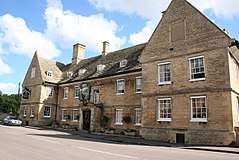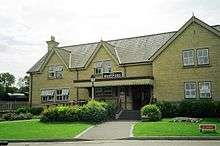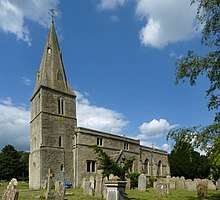Wansford, Cambridgeshire
Wansford, sometimes Wansford-in-England,[1] is a village just off the A1 road near Peterborough and eight miles south of Stamford.
| Wansford | |
|---|---|
 The Haycock | |
 Wansford Location within Cambridgeshire | |
| Unitary authority | |
| Ceremonial county | |
| Region | |
| Country | England |
| Sovereign state | United Kingdom |
| Post town | Peterborough |
| Postcode district | PE8 |
| Police | Cambridgeshire |
| Fire | Cambridgeshire |
| Ambulance | East of England |
| UK Parliament | |
History
.jpg)

The Great North Road crossed the River Nene here by Wansford Old Bridge, now a Grade I listed building. The stone bridge replaced a wooden bridge with eight arches damaged by floods in 1571.[2] The Great North Road was diverted to the east and the 1920s concrete brdge is itself Grade II*; it now carries the northbound carriageway of the A1.
Wansford is under two parish councils. Wansford Parish Council, within the area of Peterborough City Council, comprises the village north of, and including, the Old Bridge. The village to the south of Wansford Old Bridge (The Haycock side) is represented by Sibson-cum-Stibbington Parish Council and comes under Huntingdonshire District Council. Wansford station is in Stibbington parish. There is a GP surgery, Wansford and Kings Cliffe Practice on Yarwell Road, to the north of the river. The village has a small post office store, a hairdressers and a private dental surgery. A new cafe bistro, The Wansford Lounge opened in 2017.
It was split between two counties until 1965 when it came under one authority, (Huntingdon and Peterborough and, from 1974, Cambridgeshire). The boundary post between the Soke of Peterborough in Northamptonshire (the north side of the River Nene) and Huntingdonshire (the south bank) is still there halfway across the bridge.[3]
On 2 May 2007 the helicopter of Phillip Carter, entrepreneur and owner of the Haycock Hotel, was found, crashed nearby in woods at Kings Cliffe.[4]
"Wansford-in-England"
According to local folklore, related in Defoe's A tour thro' the whole island of Great Britain (1724), the name Wansford-in-England comes from the tale of a local man who fell asleep on a hayrick and upon awakening found himself floating down the River Nene towards the sea. He asked a traveller on the riverbank where he was, and upon hearing the reply "Wansford", asked, "Wansford in England?". The name stuck and the Haycock Hotel takes its name from the legend.[5]
This version of the story seems to be derived by oral transmission from "Barnabæ Itinerarium, or Barnabee's Journal", an account of four long and often drunken journeys north through England published by Richard Brathwait in 1638 and reprinted in 1820, with extensive notes, by Joseph Haslewood.[6] The hero, Barnaby, was allegedly born in Appleby-in-Westmorland, and his surname may have been Harrington (there was much discussion of the truth of these facts in prefaces to later editions - and indeed as to whether Barnaby had ever existed).[7] The poem is written in elegant Latin verse with a parallel translation into English doggerel (only the English is given here).[8]
The references to Wansford are in the third journey, after Barnaby has visited Stilton and before he heads north to Stamford. As the second verse shows, he arrived when Wansford had been hit by the plague and the doors were marked with warnings.[9]
Thence to Wansforth-brigs, a river,
And a wife will live for ever;
River broad, an old wife jolly,
Comely, seemely, free from folly;
Gates and gardens neatly gracious,
Ports and Parks and pastures spatious.
Seeing there, as did become me,
Written, Lord Have Mercy On Me,
On the Portels, I departed,
Lest I should have sorer smarted;
Though from death none may be spared,
I to dye was scarce prepared.
On a Hay-cock sleeping soundly,
Th'River rose and took me roundly
Downe the current; people cryed,
Sleeping, down the streame I hyed;
Where away, quoth they, from Greenland?
No; from Wansforth-brigs in England.
Three stanzas of "Barnabæ itinerarium, or, Barnabee's Journall" by Richard Brathwait (c.1588 – 1673).[10]
Architecture

The Parish Church of St Mary the Virgin is a Grade I listed building.[11]
Wansford railway station, 1.5 miles S.E. of the centre of the village, is the home of the Nene Valley Railway.
The Haycock hotel, a coaching inn, is situated to the south of the stone bridge over the River Nene.
See also
References
- Defoe's Curious and Diverting Journies
- Historic England. "Wansford Bridge (to Cambridgeshire County boundary) (Grade I) (1274654)". National Heritage List for England. Retrieved 1 June 2020.
- Wansford Bridge Hidden Heritage (retrieved 13 June 2011)
- "Helicopter crash near wansford kills four". Peterborough Telegraph. 13 November 2008. Retrieved 2 January 2018.
- Ash, Russell (1973). Folklore, Myths and Legends of Britain. Reader's Digest Association Limited. p. 279. ISBN 9780340165973.
- Brathwait, Richard (1820) [1638]. Haslewood, Joseph (ed.). "Barnabæ itinerarium, or, Barnabee's Journall Vol 1". Google Books. Retrieved 2 January 2018. (Also known as Drunken Barnaby's Four Journeys to the North of England.)
- Brathwait, Richard (1820) [1638]. Haslewood, Joseph (ed.). "Barnabæ itinerarium, or, Barnabee's Journall Vol 1". Google Books. pp. 7, 23, 24, 37. Retrieved 2 January 2018.
- Brathwait, Richard (1820) [1638]. Haslewood, Joseph (ed.). "Barnabæ itinerarium, or, Barnabee's Journall Vol 1". Google Books. p. 409. Retrieved 2 January 2018.
- Brathwait, Richard (1820) [1638]. Haslewood, Joseph (ed.). "Barnabæ itinerarium, or, Barnabee's Journall Vol 2". Google Books. pp. 239, 241, 243. Retrieved 2 January 2018.
- Brathwait, Richard (1820) [1638]. Haslewood, Joseph (ed.). "Barnabæ itinerarium, or, Barnabee's Journall Vol 2". Google Books. pp. 239, 241, 243. Retrieved 2 January 2018.
- Historic England. "Church of St Mary The Virgin (Grade I) (1127442)". National Heritage List for England. Retrieved 16 March 2020.